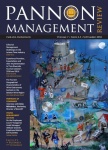7 / 2 (September 2018)
Archive issue
Archive issue

Author(s)  | Title  | Year  | |
|---|---|---|---|
  | Zoltán Veres | 2018 (7/2) | |
  | Márta Kóródi; Csilla Kalmárné Rimóczi | 2018 (7/2) | |
Abstract: The comprehensive study is based on the database of questionnaire research in the settlements of Tisza riverside, in the summertime from 2010 to 2016. Inquiry form apart from standard questions, focused on the different elements of the experience on demand or supply side, deepening the query toward the motivation or satisfaction. Issues of research focus on factors influencing travel decisions usually or during actual travel, the intended and actual intensity of the individual experience factors, the satisfaction with tourism product items, the attitude of local products consuming, the accommodations, the spending and spending structure and other travel habits. In addition to the experiencecentred approach, product orientation can be traced, and it is also possible to define the characteristics, consumption habits and subtypes of the riverside tourists of Tisza, their preferred experience elements, which as part of the experience basis or the generated experience supply may contribute to the further development of this area. The result of the research is the determination of “the Tisza riverside tourist profiles” according to age groups. | |||
  | Géza Szabó; Bence Závodi | 2018 (7/2) | |
Abstract: The festival tourism sector in Hungary has gone through a tremendous development over the last few years. Several of the Hungarian festivals attract tens of thousands of people, and most of the festivals attract international guests as well. The festivals of selected importance are well supplemented by events of smaller size and range, as a result of which the festival offer of Hungary is diverse and complex. Wine gastronomy festivals, the central element of which is wine, are now dominant factors in the festival offer of Hungary. Coming from the particularities of the topic we relied on secondary methods in the first place, such as processing the related literature and the collection of wine gastronomy festivals from different sources. Wine gastronomy festivals are usually linked to the wine producing areas of Hungary, and also to the destinations most visited by tourists. Hungary possesses seven wine regions; the Balaton Wine Region is of special importance, mainly due to its renowned wine producing areas. The Wine Region has a total of six wine producing areas, four of which are more important than the remaining two, especially because of their direct connection to Lake Balaton. The Balaton Wine Region is one of the wine gastronomy centres of Hungary, proven by the fact that onethird of all wine gastronomy events organised in Hungary in 2016 took place here. The authors of this paper try to find out what special features the wine gastronomy supply of Balaton Wine Region has and to what extent these are compatible with the national trends. | |||
  | Portraits of Companies | 2018 (7/2) | |
  | Gyöngyi Hajmásy | 2018 (7/2) | |
Abstract: This study analyses the attitudes of the Hungarian four- and five-star hotels toward employee-related corporate social responsibility (CSR) activities. Workforce is one of the most important dimensions of corporate social responsibility (CSR). In spite of rising interest in CSR in various industries, including the lodging industry, employee-related activities are a rarely examined subject in the hospitality context, even though employees in the lodging industry are one of the key factors of hotels’ quality service delivery. They have direct connection with hotel guests, consequently they can largely contribute to customer satisfaction through appropriate service delivery. Thus this study examines the Hungarian high-quality hotels’ attitude towards employee-related CSR activities. According to a survey based on the opinion of the Hungarian four- and five-star hotel executives, the most important initiatives tended to ensure healthy and fair working conditions, ensure non-discrimination and equal opportunities for new candidates and ensure internship opportunities to students. Hotel executives reported that customer satisfaction, cost savings and branding-related outcomes were the main reasons for CSR implementation. | |||



